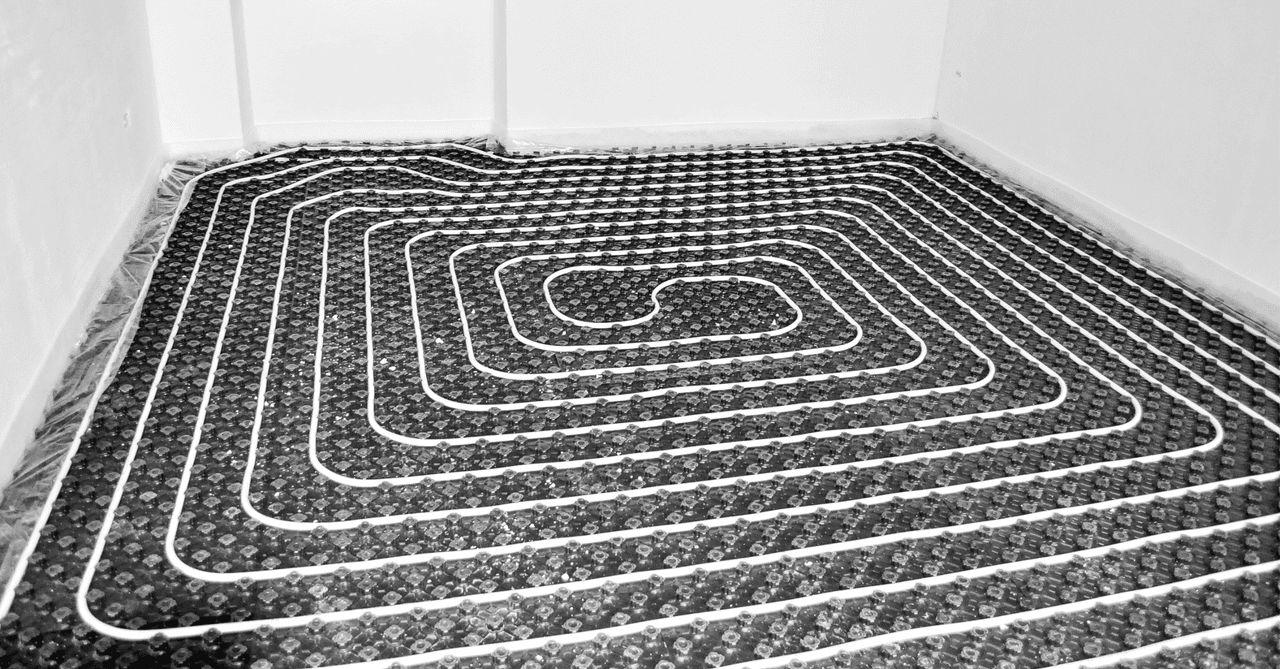
Even with a cozy heating temperature, maintaining warm feet during chilly winter days can be challenging. For those of us who shiver as soon as winter veers its ugly nose, and long for warm summer days, there’s a way to spare the discomfort of frozen toes: getting a floor heating system installed.
Deciding on installing a heated floor system in the family home means choosing a comfortable and evenly heated household.
When faced with making an informed decision to purchase such a system, you have to clearly understand the related benefits of each type of floor heating system as well as the costs involved.
Electric or Hydronic: Which Floor Heating Is Best?

Source: Canva
Floor heating is a heating system renowned for its efficiency, but also for the comfort it brings a household. While its installation is more costly compared to a radiator heating system, its equipment remains more modern and healthier for that of your family.
There are two types of floor heating systems:
An electric floor heating system emits infrared rays that heat the floor and nearby walls.
The hydronic floor heating system channels a liquid through its piping; the liquid is preheated since it’s from a heat pump or boiler.
Hydronic Radiant Floor
To ensure that the radiant floor heating you chose specifically meets your needs, consider the information provided below. Generally speaking, a hydronic radiant floor is more efficient in areas with larger square footage compared to smaller-sized spaces.
Since having access to a hot water source is imperative to carry out its installation, the costs related to purchasing a heat pump or a boiler can be rather steep if the floor heating system is intended for a small surface.
Having hydronic floor heating means one can benefit from a system that may also have a cooling function, meaning homeowners can heat and cool their floors based on circumstantial needs. While this dual-function model is more expensive, it allows one to benefit from their hydronic floor year-round.
Condensing boilers supply water for heated floors
An increasing number of people are opting for the installation of a condensing boiler, as it stands as one of the most efficient boiler models available on the market. The condensing boiler boasts several advantages, most notably the fact that energy losses (fumes, steam) are a result of recovered combustion, which is subsequently transformed into thermal energy.
Electric Underfloor Heating System
When it comes to electric underfloor heating, this system is well-suited for areas with smaller square footage. Note that this type of heating system offers excellent value for money. If you’re considering a D.I.Y. installation for your radiant floor system, note that it’s feasible. Also, not only is this type of underfloor heating system easy to install, but it also requires less tedious maintenance compared to a hydronic system.
However, opting for this type of floor entails another bit of decision-making: choosing between a loose cable or mesh mat system. The former involves a network of cables with predetermined lengths, making it impossible to extend or shorten. This installation requires pouring self-levelling cement to ensure the cables adhere properly to the ground.
As for the mesh mat system, the latter is sold in roll format. If you anticipate the need to trim the material in several places, this could potentially be more time- and labour-intensive. However, this system benefits from not requiring self-levelling cement during installation. In fact, the heating cable is already fitted to fibreglass meshes.
Benefits of Radiant Floor Heating

Source: Canva
In actuality, the surface area where the heating cables are installed works similarly to a really big radiator, heating from below. Needless to say, this little bit of luxury is especially appreciated during winter. Radiant floor heating offers a host of advantages, of which we can mention:
1- Comfort and well-being
One of the main advantages of a radiant floor is without a doubt the comfort it provides. This type of installation generates a gentle and evenly distributed heat to the overall surface under which it’s installed. Therefore, there’s no heat loss or sudden temperature spikes, as it maintains constant heat for continuous comfort. Its thermal comfort far exceeds that of all other common types of heating since the heat is evenly distributed in every room, both vertically and horizontally.
2- Space gain
Radiant floor heating systems have the benefit of being installed beneath the flooring, rendering it completely concealed. The floor plan and the furniture positioning in rooms are thus not affected at all. Since there aren’t any baseboard heaters lined up against the bottom section of your walls, you have the entire floor plan at your disposal to position your furniture and window treatments, or any other decorative feature, wherever you see fit.
3- Quick-drying floor
When installed in humidity-prone areas, like a bathroom or kitchen, radiant floor heating prevents flooring from remaining wet for extended periods. Consequently, there's less risk of humidity-caused damage. The same concept applies when mopping the floors around the house with water. While most heating systems will help dry the flooring after one or maybe two hours, with radiant underfloor heating, the drying time is cut down to minutes.
4- Noiseless
Heated floors are completely inaudible since they don’t function with a motor or fan, which is the primary cause of the wind tunnel effect. This precious commodity is especially appreciated by those who are triggered by, or sensitive to, noise, but also by individuals who suffer from different dust-related health problems or allergies. This type of heating system functions through radiation, therefore it doesn’t emit dust, unlike traditional heaters. This is a significant advantage for individuals suffering from respiratory-related illnesses.
5- Energy saving
Although its initial installation entails a significant investment, the benefits of a heated floor can lead to substantial long-term savings. Nonetheless, determining the exact amount saved can be challenging to pinpoint since it really depends on the specifics of the house in which it’s installed, especially insulation-wise.
What type of flooring should be installed over heated floors?

Source: Canva
Choosing flooring that’s compatible with the heat generated by the underfloor heating system is crucial. However, the heating pipes and cables can be installed beneath several layers of flooring. But, you’ll still have to choose materials that can retain and store the heat generated for as long as possible, and among these heat-conductive materials, there are concrete, natural stores, and ceramic tiles.
On the other hand, steer clear of flexible flooring, the latter will act as insulation. For that reason alone, carpeting is advised against, as carpet is a material that’ll create a complex transmission barrier between the floor surface and the space above it. Similarly, both linoleum and vinyl sheet flooring shouldn’t be paired with underfloor heating, just as wood is ill-fitted due to its susceptibility to temperature changes.
Check out this video shot by Julia, our video content creator, at one of our contractors’ construction sites:
And, to learn more about radiant floor heating systems, we met with Christopher Igreja of Schluter Systems.
Cover image: Flickr Jason Lander
Get 3 quotes for your floor heating installation project
RenoQuotes.com can help you get quotes for your floor heating project. By submitting your project, we’ll put you in contact with top-rated contractors. Fill in the form on the homepage (it only takes a few minutes) and get estimates from trusted professionals.
Dial 1-844 828-1588 to speak with one of our customer service representatives.
Looking for something else?
Related articles
The latest industry news, interviews, technologies, and resources.

Editorial Team
•17 Feb 2025
Electric underfloor heating systems, also known as radiant underfloor heating, are a modern and efficient solution, appealing to an ever-increasing number of homeowners. Why? Because these systems allow heat to spread evenly from the ground up, eliminating drafts and providing unparalleled thermal comfort.

Editorial Team
•08 Nov 2023
Although not all households are able to accommodate a central-air system, during the summertime even they will need a way to stay cool. Luckily the saviour comes in the form of a wall-mounted air conditioner.

Editorial Team
•28 May 2025
Both a place of rest and relaxation, the gazebo allows you to enjoy beautiful weather without fear of suffering the negative effects of too much sun. The gazebo offers shaded space that is difficult to do without, and this is why more and more homeowners are choosing to install it in their backyards. Are you also thinking about it? To learn more about this type of shelter, read on!

Cynthia Pigeon
•08 Nov 2023
If there is one thing every homeowner dreads before starting a renovation project, it has to be the possibility of encountering unforeseen issues, especially the possibility of exceeding the set budget for the project. So, here is a tidbit of advice on how to deal with such a situation should the hired contractor carry out additional work or should you discover a hidden defect.

Editorial Team
•18 Dec 2024
Do you want to partition off a space in your home without erecting walls? Looking to combine your kitchen and living room without wafting cooking smells? Or simply setting up an office space that isn't windowless? The glass partition is just what you need.